Vegetarian Ecofeminism.

This image to me represents a human’s relationship to meat. I see what could be a male like figure, but that is unclear. This figure has a knife inserted into the meat as if it had killed the animal itself. It shows domination over a piece of flesh that it is about to consume. The image of the meat is sterile. It does not correlate to an animal or body part. It appears like just a thing on a cutting board. Perhaps the meat industry would prefer that we see meat in this way. Emotionless, faceless and non bloody? I’m sure animal rights activists would prefer we see images of animal cruelty when we are about to consume meat products. This character is faceless and emotionless as well. Maybe the professor wants us to see that the sterile meat and emotionless figure is how we see our meat. As not being an animal, but just as food that we consume.
As part of this weeks reading material, there was an article in Huffpost.com titled Meat Heads, by Zoe Eisenberg. The article mentions the relationship between food and the differences between men and women. In the media and in Western society we see time and time again a man chowing down on a rare or bloody piece of beef and a woman politely eating a salad or a plate of greens. This image plays into the stereotype that men need meat to build strong muscles and women are too ladylike or feminine to eat a “manly” piece of steak. It’s not often we see a man ordering a salad or something without meat in films or commercials. It further perpetuates the idea we already have about men eating the way they wish to and women carrying the burden of watching their “waistlines” to avoid gaining weight and becoming unattractive to men. “ In western society everything comes down to marketing. The idea that the bloodier the steak, the more manly the man is backed by the entertainment industry” (Ayinde Howell, vegan blogger iEatGrass.com).
In order to change these societal stereotypes of men and meat, we should focus on more men especially athletes who are vegan or vegetarian. There are several top athletes who have elected to follow either a vegan or vegetarian lifestyle. Olympic medalist, track star, Carl Lewis is a vegetarian. While Colin Kaepernick, former quarterback for the 49ers is a vegan. These men are what society would consider “manly” men who have ditched the beef for carrots and broccoli.
In western countries, we are becoming more and more aware of the antibiotics, steroids, and hormones that the meat industry injects into our meat supply. Still our society elects to turn a blind eye and to follow keto diets, and feast on giant steaks. “Steroids are considered dangerous to athletes, but animals that have been genetically engineered and chemically induced to grow faster are considered a different issue” (Curtin).
America is very diverse when it comes to restaurants and eating out. There is really no reason that people in the United States need to stick to a meat heavy diet. There are so many restaurants that offer vegetarian and vegan options these days.
Gendered food
 Gendered foods is a socially constructed idea that has been fed to us through the media for years. Women are expected according to society to be more dainty eaters. We continuously see how movies portray women on dates where they order just a salad, while the man orders meat. Here is a good example of a film perpetuating this stereotype of gendered food. https://youtu.be/gc_5tx7xRlg. It shows the woman ordering soup, salad and fish as her entree. The man then asks for information about the old 96er, a giant 96 oz. steak.
Gendered foods is a socially constructed idea that has been fed to us through the media for years. Women are expected according to society to be more dainty eaters. We continuously see how movies portray women on dates where they order just a salad, while the man orders meat. Here is a good example of a film perpetuating this stereotype of gendered food. https://youtu.be/gc_5tx7xRlg. It shows the woman ordering soup, salad and fish as her entree. The man then asks for information about the old 96er, a giant 96 oz. steak.
In the essay written by Deane Curtin, Contextual Moral Vegetarianism, Curtin writes that “women are often associated with vegetables and passivity, ladies luncheons offer dainty sandwiches with no red meat.” I can’t tell you how many times I’ve been at a women’s event where the offer is a vegetable platter, a fruit plate and finger sandwiches made with tuna fish or egg salad.
Ecofeminist perspective on non-human animals.
 In the essay written by Greta Gaard, she informs us about the ecofeminist belief regarding non-human animals. She believes that even in the relationship between humans and domestic pets, that we humans are oppressors. “ To be a pet is to have all of life’s decisions controlled by someone else; when and what to eat, how to act, whom to socialize with, whether or not to reproduce. If the situation were offered to humans, we’d call it slavery”(Gaard).
In the essay written by Greta Gaard, she informs us about the ecofeminist belief regarding non-human animals. She believes that even in the relationship between humans and domestic pets, that we humans are oppressors. “ To be a pet is to have all of life’s decisions controlled by someone else; when and what to eat, how to act, whom to socialize with, whether or not to reproduce. If the situation were offered to humans, we’d call it slavery”(Gaard).
As much as I agree that humans do oppress animals. I don’t know that I necessarily agree with Gaard’s perspective of the domestic pet/human relationship. Think for a moment about human babies, it’s much the same if you look at it. We are in complete control of our infants, and up until those infants grow into the appropriate age to be safely afforded freedoms of their own. We make all of the decisions for our children, just as Gaard describes how we do with our pets. We decide when and what our babies and young children eat. We choose their clothes, their toys, their bed times, their schools, even with whom they go on play dates. Until they are able to form their own friendships, we choose their friends. We certainly wouldn’t allow our two year old to run free out in the street simply because he asked. Neither would we allow our beloved pets to run free in the streets for the same fears, that they may become injured or killed. Gaard conveys the importance of providing the best life we can for our domestic pets, and I completely agree. Just like a human baby, our pets didn’t choose to come live in our homes. We made the choice, as such it’s our responsibility to provide the best home and environment possible.
Ecofeminist approach to non-human animal companions 
I accept my complicity in a system of inter species domination, that was created when man domesticated animals for his own pleasure. I serve as an ally to the animals to whom I’ve committed my life. I provide them with love, compassion, quality food, clean water and clean bedding. Gaard advocated for the bird in the video/pizzeria in a similar way. I believe this is an ecofeminist position on the relationship between non-human domestic animals and humans.
I do agree that once upon a time we made the decision to domesticate animals, and as a result we have a relationship with animals wherein they are completely reliant upon us for their survival. So, it is up to us and to ecofeminist to educate people on the proper care of animals. As far as non domestic animals such as those the meat and dairy industry see as food sources, I agree that the treatment of those animals is atrocious. While I’m not a vegan or vegetarian, I limit my meat consumption to no more than three times per week. I have fish one day and usually a form of poultry. However I do eat eggs and cheese. I try to buy responsibly, by buying bio (organic) meat, cheese and egg options. The bio market near my house offers cruelty free options of meat and eggs. Their suppliers are local farmers nearby, where chickens are free range and grass fed.
According to the essay written by Deane Curtin,“there’s a connection through food between the oppression of women and the oppression of non-human animals. Many western societies view non-human animals as food sources, or as inferior beings, so it’s easier for most to ignore the inhumane treatment of food source animals like pigs, chickens, cows and the like. Curtin talks about moral vegetarianism, an idea that we should try at all costs to avoid abusing or causing the pain and suffering of a sentient being for our own enjoyment or consumption. “For economically well-off people in technologically advanced countries, they have a choice of what food they want to eat”( Curtin). Ecofeminist, vegans, and vegetarians believe that non-human animals should no longer count as food.
How science is stepping in
 Scientists around the world are working on new meatless options. They are creating meat using animal cells through a process called in vitro cell culture. Could this become the new way we enjoy a burger? This option will certainly upset the meat industry, but it could save lives. I believe that reducing our meat consumption is the best way to protect non-human animals. However, since we will never eliminate meat eaters completely, we can at least lobby for a more humane treatment of food source animals. “Factory farms are responsible for most of the 6 billion animals killed for food every year in the United States. If there were improved regulations, and strictly enforced rules against inhumane treatment of food source animals, these numbers could certainly decrease.
Scientists around the world are working on new meatless options. They are creating meat using animal cells through a process called in vitro cell culture. Could this become the new way we enjoy a burger? This option will certainly upset the meat industry, but it could save lives. I believe that reducing our meat consumption is the best way to protect non-human animals. However, since we will never eliminate meat eaters completely, we can at least lobby for a more humane treatment of food source animals. “Factory farms are responsible for most of the 6 billion animals killed for food every year in the United States. If there were improved regulations, and strictly enforced rules against inhumane treatment of food source animals, these numbers could certainly decrease.
Cultured meat, https://en.m.wikipedia.org/wiki/Cultured_meathttps://en.m.wikipedia.org/wiki/Cultured_meat
Curtin, Deane, Contextual Moral Vegetarianism, spring 1991, http://www.animal-rights-library.com/texts-m/curtin01.htm, Feb. 20,2020
Dawson, Allen, These 19 elite athletes are vegan — here’s what made them switch their diet, 01, No. 2018, https://www.businessinsider.de/international/vegan-athletes-and-why-they-changed-their-diet-11/?r=US&IR=T02/22/2020.
Eisenberg, Zoe, Meat Heads: New Study Focuses on How Meat Consumption Alters Men’s Self-Perceived Levels of Masculinity, Jan.13,2017 HuffPost.com February 21,2020 Article: https://www.huffingtonpost.com/zoe-eisenberg/meat-heads-new-study-focuses_b_8964048.html?ncid=engmodushpmg00000006
Gaard, Greta, Ecofeminism on the Wing, (2001) 19-22 Feb. 21,2020 https://www.academia.edu/2489929/Ecofeminism_on_the_Wing_Perspectives_on_Human-Animal_Relations
Annotated bibliography
Greta Gaard is a writer, associate professor, activist, environmentalist and ecofeminist. She is currently a professor of English in Wisconsin. She works to bring awareness to the association between non-human animals and male domination/female oppression. She is a published author of several ecofeminist publications.


I think the case that Gaard makes about having animals as pets is very interesting. I do see her point that if the same thing were done to humans, it would be considered slavery. I do believe that sentiment to a certain extent. While you pointed out that domesticating and breeding certain animals as pets was initially a decision made a long time ago, I think we continually choose to continue that pattern. Dogs are a very common household pet, yet the dog industry is very violent and abusive. It is very easy to look past it just as it is common to look past the meat industry. Dogs are mass produced in dangerous puppy mills. Animals are treated as machines in order to have as many puppies as possible. They are kept in horrible condition. Look on the website https://www.paws.org/resources/puppy-mills/ for extensive info. I think in this case, Gaard has a point. I rescued a dog about eight months ago who is a puppy mill survivor. She was used as a breeding mom but became very sick. She was posted on Facebook that somebody needed to come get her or she was going to be put down. The very next day, she was in my house. She has extensive trauma and is still learning how to trust. It breaks my heart knowing what she went through. That makes me feel cold towards the pet industry! However, I think that having a pet can be ethical. I think there are tons of rescues where you are literally saving a dog or cat’s life if you adopt them. I don’t think it’s black or white. I think that it needs to be done ethically.
Hi, thanks for your comment. I am fully aware of puppy mills and how awful they are. I would never buy an animal when there are so many in shelters that need homes. Having said that, I have two dogs. One I received from a friend who’s dog had one litter and she gave the puppies to her friends and neighbors to ensure they went to good, loving homes. My other dog is a rescue. She was a street dog from Mississippi, otherwise, we know nothing of her history. We do know she was deathly afraid of fire which she has now overcome and is a tail-wagging well-adjusted dog.
I never said anything about breeding dogs, as your comment insinuated so I am unclear whether you used that as rhetoric to make a point, but that is not factual information. What I said was that domestic animals are here and they have been for hundreds of years, here’s some info on that: https://pets.thenest.com/long-dogs-cats-domesticated-8595.html. As such, it is our responsibility to provide the best care possible, and that is exactly what I have done and continue to do with mine. I believe what Gaard was saying is that animals are here, and there’s nothing we can do about that fact. So, as ecofeminists, it’s our responsibility to advocate for them and if we have the opportunity, to help provide a loving and kind home for them, which is, and has been my commitment.
Just to bounce off the “domestication of dogs a long time ago” and “puppy mills” conversation…I’m glad you mentioned the domestication of animals.
Gaard mentions that “we can limit or forgo relationships with other species as pets and live instead with the longing for a wild animal companion” but also maintains to treat your pets responsibly (page 22). I think the first is an interesting statement/ideal and I would personally apply this to non-domesticated species.
Dogs have an interesting history with humans starting with Wolf packs who, because of the hunt, survived side by side with humans. The current method of thought is that wolves domesticated themselves as the friendliest of wolves survived and ate alongside humans. The physical changes that happen from wolf to all of the doggy traits we know of today are results from the friendliest dogs breeding and then human manipulation of desired traits etc…
With this said, I think that the orginal domestication of dogs was a natural survival technique. However, to think that Gaards thought of not having pets, or not having dogs as pets in particular would be troublesome. Also agree that you should treat pets cats/dog with respect and make sure they have water and food and toys and all the other things that add to their general well being, like a good vet.
Interestingly enough Instanbul, Turkey has a number of stray dogs living in the city. You see them everywhere, eating food, laying in the streets, in the public transportation systems etc.. and it seems like the people and the dogs have developed a cohabitating relationship that is not necesarily pet-oriented.
https://www.smithsonianmag.com/science-nature/how-wolves-really-became-dogs-180970014/
Hi there! I’m so glad you included the image of the salad versus the steak. In my blog, I made the same connection between men and steaks and women and salads. It’s almost frustrating in a way dealing with gendered foods. As a feminist, I want to be taken seriously, equally, and perceived as strong rather than the stereotypical ‘weak’ woman. At the same time, I like to embrace my femininity! It is who I am and, I love being a woman. I love all of my feminine traits and, it is quite frustrating being perceived as masculine for ordering a steak. I agree that Zoe Eisenburg’s article Meat Heads really explained gender connections between food.
I absolutely loved Deane Curtin’s article. “According to the essay written by Deane Curtin,“there’s a connection through food between the oppression of women and the oppression of non-human animals. Many western societies view non-human animals as food sources, or as inferior beings, so it’s easier for most to ignore the inhumane treatment of food source animals like pigs, chickens, cows and the like. Curtin talks about moral vegetarianism, an idea that we should try at all costs to avoid abusing or causing the pain and suffering of a sentient being for our own enjoyment or consumption. “For economically well-off people in technologically advanced countries, they have a choice of what food they want to eat”’. I appreciated that you included this quote from Curtin’s article because, it is what truly helped me to understand the connection.
Initially, I had a difficult time to make the connection between vegetarianism and feminism. I racked my brain trying to find a connection and, it wasn’t until Curtin’s article that a ‘light went off’. The way Curtin draws on the oppression of women being the same as oppression of animals was completely enlightening. Animals, as sentient beings, should share the same respect and humane treatment as homo sapiens do. What did you think of Gaard’s article regarding the parakeet? It reminded me of my mom and I.
I am not sure about you but, I’m curious to know if you are a vegetarian or vegan? I tried to become vegan a few times in the past and stopped. I currently eat meat with every dinner but, now I’m dreading cooking dinner. All my reading and research into this blog has made me feel a little sick and disheartened to even get the chicken out of the fridge…I’m just curious if you had any similar feelings.
Hi, thanks for the comment and feedback. I related to Gaard’s story of the parakeet. I have always been an advocate for children and animals. I’ve called the police on animals being left in cars on hot days. I’ve done the same with children. I’ve reported pet abuse to authorities when someone in my neighborhood was kicking his dog. I’ve rescued several dogs and a couple cats during my lifetime. I think what Gaard wanted us to take from that story is that we all have to advocate for those who cannot for themselves. If we see abuse we have a moral obligation to stand up and say something, or do something if possible.
I am not a vegan or vegetarian. I do still eat meat, mostly just poultry and fish. I know I’m in denial still about the way the meat I buy gets to my table. Humans have the ability to pretend that their meat is just a faceless food item. I’ve really almost stopped eating beef, the flesh of the beef is difficult for me to chew and not think of flesh. I think that I’ve not associated that thought or feeling when I eat chicken or fish…..yet! I’m sure that’s coming. I do buy my meat from the organic market near my house. I eat meat three times per week, so I am trying to be better. I know the chicken I buy is from a local farm, I’ve been to the farm, I’ve seen how the animals are treated, and I feel a little better about choosing chicken and eggs from there.
I live in a meat culture. Germany is very much into meats. They love pork, It’s everywhere! There’s a butcher (fleischerei) on every corner, across from a bakery which is also on every corner. For people who love meat it’s great, but not great for animals. I don’t think we will ever end meat consumption in the world, but what we can do is educate ourselves on how these animals are being treated and try to advocate for better treatment.